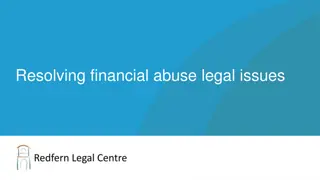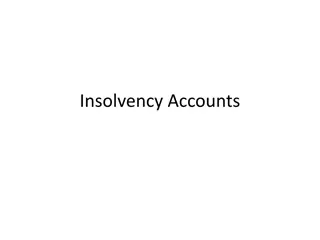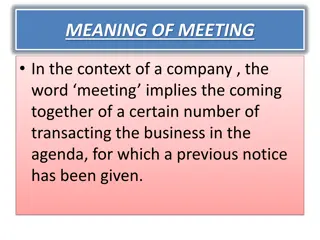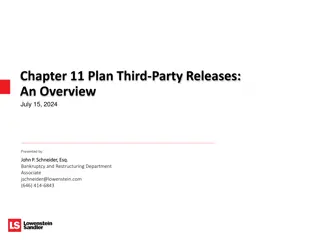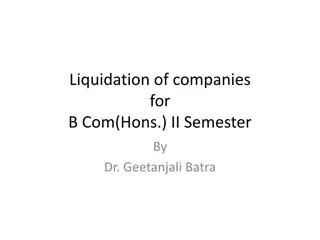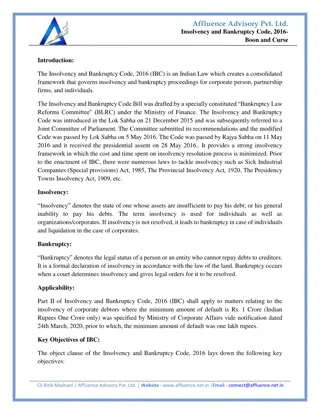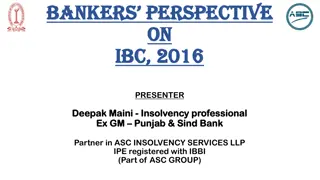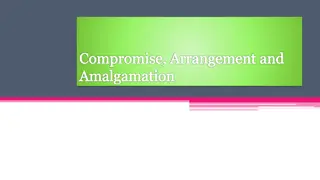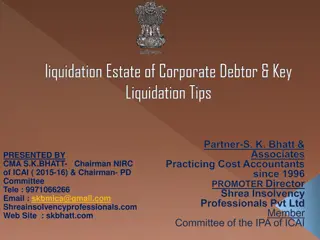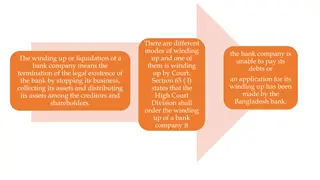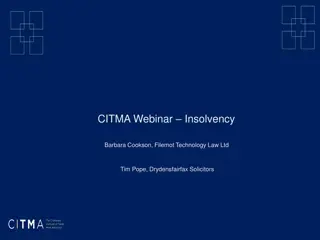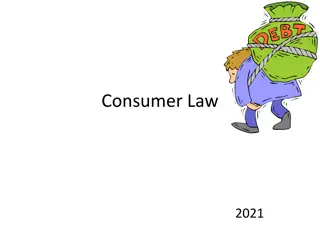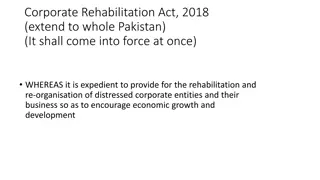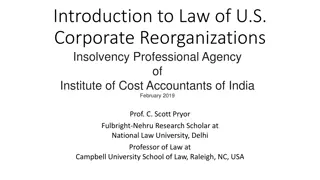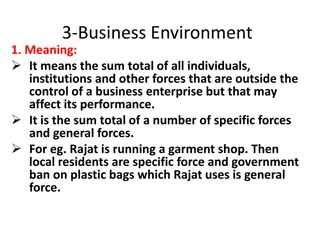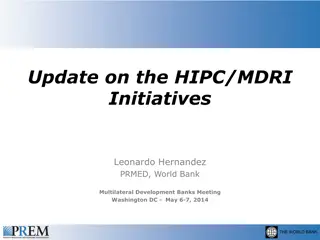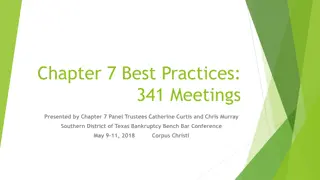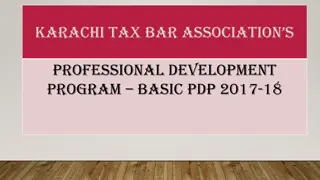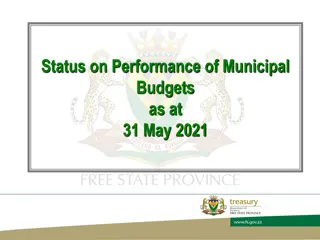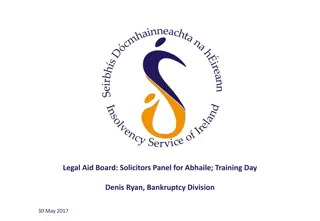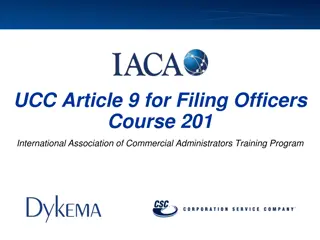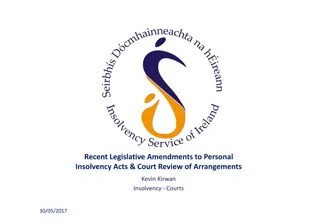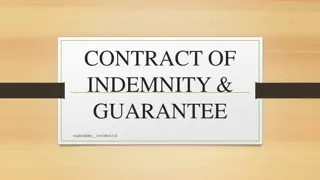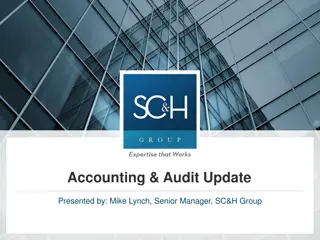SA Post Office Financial Analysis and Challenges
An analysis of the SA Post Office's income statement, creditors, financial trends, challenges, and situational context. It also outlines the Post Office of Tomorrow strategy and strategic pillars.
5 views • 16 slides
One Helpful Option for Bad Creditors are Same Day Payday Loans
You only need to submit a brief application form to the financier with a few of your private details in order to apply for a same day payday loans for free and on the same day.\nhttps:\/\/nuevacash.com\/\n
3 views • 1 slides
Understanding Voluntary Surrender of Estate and its Benefits
Voluntary surrender of estate allows a natural person facing insolvency to apply for sequestration, providing legal protection against creditors. This process involves submitting an affidavit and court application, with applicants not required to appear in court. Different scenarios illustrate when
3 views • 12 slides
Factors Influencing Working Capital Management
Factors influencing working capital include the nature and size of the business, demand of creditors, cash requirements, time for manufacturing goods, volume of sales, terms of purchases and sales, and the business cycle. The nature of the company, creditor demands for security, cash needs, and the
0 views • 7 slides
Resolving Financial Abuse: Legal Issues and Consumer Credit Law
Learn about resolving legal issues related to financial abuse, consumer credit law, crafting financial hardship requests, negotiating with creditors, getting specialist legal advice, and testing your knowledge on financial matters. Gain insights into consumer credit law, the National Consumer Credit
0 views • 67 slides
Understanding Debentures and Charges in Company Law
Debentures play a significant role in company law, representing various types of securities issued by a company. They are defined under the Companies Act and have specific characteristics, such as being under common seal, repayment terms, interest payments, and charges on movable property. Debenture
0 views • 21 slides
Understanding Insolvency Accounts and Laws in India
Insolvency accounts come into play when a debtor is unable to pay debts fully, leading to a legal process supervised by the government for debt resolution. Various scenarios constitute an act of insolvency, such as transferring property to defraud creditors or notifying them of debt payment suspensi
0 views • 38 slides
Understanding the Essentials of Company Meetings
In the context of a company, a meeting involves the gathering of individuals to discuss and transact business outlined in the agenda, after issuing prior notice. Various types of meetings such as members, directors, creditors, and more have distinct requisites for validation. Key elements include pr
0 views • 27 slides
Understanding Third-Party Releases in Chapter 11 Bankruptcy Plans
Chapter 11 bankruptcy plans often include provisions for third-party releases, releasing non-debtor entities from claims held by creditors. These releases can impact various stakeholders, from insiders to affiliates, and involve consent through opt-out mechanisms. In the Third Circuit, such releases
3 views • 8 slides
Liquidation of Companies: Procedures as per IBC 2016
The process of liquidating a company involves collecting and selling its assets to pay off debts, with remaining funds distributed to shareholders. Under the Insolvency and Bankruptcy Code (IBC) 2016, specific procedures must be followed, including initiation by either creditors or debtors within se
0 views • 16 slides
Understanding Internal Reconstruction in Companies
Internal reconstruction in companies involves reorganizing the financial position without liquidation or forming a new entity. It aims to enhance profitability by aligning assets with true values. Methods include altering share capital, changing shareholder rights, and compromising with creditors. N
0 views • 19 slides
Understanding Marshalling of Securities in Mortgage Law
Marshalling of Securities, as per Section 81 of the Transfer of Property Act, addresses the scenario where a property owner mortgages properties to different individuals. This doctrine ensures subsequent mortgagees are entitled to have debts satisfied from properties not mortgaged to them while prot
0 views • 20 slides
Understanding the Red Flags Rule for Identity Theft Prevention
Learn how the Red Flags Rule aims to detect, prevent, and mitigate identity theft. Explore the goals of this training, identify red flags of potential fraud, and understand the application of the rule to financial institutions and creditors. Discover what covered accounts are and how to create unit-
2 views • 15 slides
Effective Strategies for Managing Debt and Avoiding Scams
Discover practical tips for handling debt, such as creating a budget, prioritizing payments, and contacting creditors. Learn about credit counseling, debt management plans, and debt settlement programs. Gain insights on recognizing and avoiding debt relief scams. Find resources to stay informed and
4 views • 16 slides
Insolvency and Bankruptcy Code, 2016- Boon and Curse
The Insolvency and Bankruptcy Code (IBC) 2016 provides a unified framework for resolving insolvency in India, aiming to streamline processes, reduce resolution time, and protect creditors. While it enhances financial stability and transparency, chall
0 views • 4 slides
Challenges Faced by Banks in Adopting IBC
Banks face challenges in adopting the Insolvency and Bankruptcy Code (IBC) due to stringent provisioning norms, additional costs, and complexities in referring cases to the National Company Law Tribunal (NCLT). Secured NPA accounts older than 2 years, unsecured NPA accounts in the second year, and c
0 views • 20 slides
Corporate Restructuring and Merger Overview
Explore the benefits, types, and legal aspects of corporate restructuring, mergers, and amalgamations. Learn about transfer of assets, economies of scale, merger types, and landmark cases related to compromise and arrangements with creditors and members.
0 views • 23 slides
Understanding Liquidation Estate and Key Asset Components
In the process of liquidation, the liquidator forms an estate comprising various assets of the corporate debtor for the benefit of creditors. These assets include ownership rights, tangible and intangible assets, proceeds of liquidation, and more. However, certain assets owned by third parties or he
0 views • 39 slides
Winding Up of a Bank Company in Bangladesh: Legal Process and Circumstances
The winding up of a bank company in Bangladesh involves terminating its legal existence by ceasing its operations, realizing assets, and distributing them among creditors and shareholders. Section 65(I) of the law empowers the High Court Division to order winding up based on inability to pay debts o
1 views • 8 slides
Overview of Insolvency Procedures in Business and Individual Cases
Explore the different insolvency procedures such as bankruptcy, Individual Voluntary Arrangement (IVA), Company Voluntary Arrangement, Compulsory Liquidation, and Creditors Voluntary Liquidation. Understand the key aspects of each process, from initiating petitions to the appointment of IPs and the
0 views • 19 slides
Understanding Prudential Regulations in Banking
Prudential regulations in banking are essential to reduce risks for creditors and protect depositors. The State Bank of Pakistan issues regulations covering risk management, corporate governance, anti-money laundering, and more to ensure the safety and soundness of the financial system.
0 views • 9 slides
Understanding Consumer Law and Debt Collection Practices in 2021
Explore key principles, roles, and terms in consumer law and debt collection, including the rights of consumers, the responsibilities of creditors, and the regulations governing debt collection practices under the FDCPA and WCA. Learn about verifying debt, the importance of accurate information, and
2 views • 27 slides
Corporate Rehabilitation Act, 2018: A Comprehensive Overview
The Corporate Rehabilitation Act, 2018 aims to facilitate the recovery and restructuring of financially troubled corporate entities in Pakistan. It emphasizes the importance of revitalizing distressed businesses to foster economic growth and development. The Act defines key terms and outlines the ro
0 views • 21 slides
SE Hockey Financial Overview 2023-24 Part 1 & Part 2
SE Hockey's financial overview for the years 2023-24 highlights an increase in fund balance, surplus income from various sources, reduced debtors and creditors, and detailed accounts of income and expenses related to umpire appointments, leagues, competitions, and administrative costs. The summary c
0 views • 9 slides
Understanding US Corporate Reorganizations and Insolvency Law
Explore the key players in the US bankruptcy system, including bankruptcy judges, Debtors-in-Possession, and Creditors Committee in Chapter 11. Learn about basic bankruptcy concepts such as claims and priority, and the priority scheme outlined in the Bankruptcy Code. Gain insights into the legal obl
1 views • 13 slides
Understanding Business Environment: Key Features and Impact
The business environment encompasses all external factors influencing a business, including specific forces like owners, creditors, and competitors, as well as general forces like economic, social, and legal aspects. It is dynamic, interrelated, and characterized by uncertainty, requiring managers t
1 views • 19 slides
Update on HIPC/MDRI Initiatives: Achievements and Challenges
Significant progress has been made in debt relief initiatives such as HIPC and MDRI, with over $116 billion committed to eligible countries. The HIPC/MDRI Initiative is nearly fully implemented, benefiting countries by reducing external commercial debt and lowering the risk of debt distress. Challen
0 views • 20 slides
Importance of 341 Meetings in Bankruptcy Proceedings
The 341 meeting is crucial in bankruptcy proceedings as debtors must appear under oath to answer questions from the trustee and creditors. Failure to prepare can have serious consequences, and important deadlines stem from this meeting, affecting various aspects of the case.
0 views • 29 slides
Understanding Final Accounts: Key Concepts and Definitions
Explore the essential key words related to final accounts such as Debtors, Creditors, Assets, Liabilities, Fixed Assets, Current Assets, Current Liabilities, Long-term Liabilities, Purchases, Sales, and Gains. These images provide a visual representation of the concepts to help you grasp the fundame
0 views • 12 slides
Types of Finance Explained
Explore different types of finance from trade creditors to retained earnings, understanding how they work, their benefits, and potential drawbacks in various business scenarios.
0 views • 9 slides
Guide to Opening a Probate Estate in Norfolk Division Probate Court
This guide provides detailed information on the process of opening a probate estate in Norfolk Division Probate Court. Topics covered include types of openings, considerations prior to filing, heirs and devisees, notice requirements, priorities for appointment, creditors as petitioners, and the impo
0 views • 21 slides
Professional Development Program Overview for Karachi Tax Bar Association - 2017-18
Karachi Tax Bar Association conducted a Professional Development Program in 2017-18 focusing on various legal aspects including company incorporation, prescribed filings, winding up, partnership act, and the Companies Act of 2017. The program aimed to promote the healthy growth of corporate enterpri
0 views • 16 slides
Municipal Budget Performance Report: May 2021
The report provides an overview of the performance of municipal budgets as of May 31, 2021, focusing on compliance, financial performance, key findings, capital expenditure, conditional grants, outstanding debtors and creditors, bulk services debt, Covid-19 spending, and other related matters. It hi
0 views • 22 slides
Understanding Bankruptcy Laws and Processes in Ireland
Explore the legal framework surrounding bankruptcy in Ireland, covering the roles of the Official Assignee, consequences of bankruptcy, and the end-to-end process involving debtors, creditors, and the court system. Learn about key laws, regulations, and procedures governing bankruptcy, including ass
0 views • 22 slides
Understanding UCC Article 9 Filing System
The UCC Article 9 filing system plays a crucial role in perfecting security interests and providing public notice for creditors' rights adjustments. It emphasizes the importance of proper filing, searchers' due diligence, and the neutral role of the filing office in maintaining accurate records. Key
0 views • 40 slides
Understanding Financial Institutions and Concepts
Explore important topics in finance such as the Federal Deposit Insurance Corporation (FDIC), credit unions, stockholders, savings and loans, cyber banks, credit cards, due dates, creditors, credit limits, grace periods, and insurance agents to enhance your financial literacy journey.
0 views • 29 slides
Recent Legislative Amendments to Personal Insolvency Acts & Court Review of Arrangements
The recent legislative amendments to the Personal Insolvency Acts introduced new provisions for court reviews of arrangement proposals, including changes to eligibility thresholds for Debt Relief Notices (DRNs) and increased regulation of Personal Insolvency Practitioners (PIPs). The Court Review un
0 views • 41 slides
Asset Protection Strategies for Families: Tips and Insights by Daniel Timins, Esq.
Learn about important asset protection strategies for families, including safeguarding assets from creditors, understanding the protection of Social Security benefits, navigating retirement plan implications in divorce cases, preventing fraudulent conveyances, and identifying creditor protections in
0 views • 14 slides
Understanding Contract of Indemnity and Guarantee
A contract of indemnity involves a direct promise to save one party from harm caused by another, focusing on losses specifically attributable to the promisor or another person. Meanwhile, a contract of guarantee entails a promise to fulfill the obligations of a third party in case of default. Essent
0 views • 23 slides
Financial Statements Project Update on Not-for-Profit Entities
The Financial Statements Project update focuses on improving the presentation of net asset classes and providing better information on liquidity, performance, and cash flows for not-for-profit entities. Decisions made relate to liquidity presentation, operating measures, net assets, cash flows state
0 views • 27 slides




